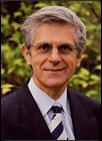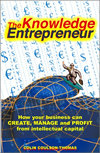 |
Are you working too hard?
By Professor Colin Coulson-Thomas
Many people work ever harder, and push themselves to the limit in order
to demonstrate concern, loyalty and commitment. Executive car parks are
full from first thing in the morning to last thing at night. Mobile phone
calls and emails never stop. Those who do not have long lists of 'things
to do' and yellow post-it notes all over their VDU screens feel vulnerable
and fear the next headcount reduction cull. Yet, research projects at
the Centre for Competitiveness to identify critical success factors for
competing and winning consistently reveal that much activity within organisations,
many management fads and a great deal of external advice from consultants
and others are irrelevant, counter productive or destroy value.
Corporate decision makers need to review whether those for whom they
are responsible are striking the right balance between activity and thought,
and between action and reaction. Maybe less 'input' and fewer interruptions
would mean more valuable outputs. We must be more selective and safeguard
quality time for reflection, reassessment and looking ahead. Companies
should encourage key staff to take sabbaticals, while longer vacations
for bureaucrats and legislators might mean less regulation and red tape.
Creative insights invariably occur outside of the 'world of work', when
doing something different allows alert individuals to spot new patterns,
links and relationships. People require quiet spaces such as patches of
grass along riverbanks where they can sit, dream, meditate and think.

Professor Colin Coulson-Thomas |
About the Author:
Professor Colin Coulson-Thomas
is an experienced chairman of award winning companies and consultant.
He has advised over 80 boards on how to improve board and corporate
performance, leads the world's largest winning business research
and best practice programme, and has reviewed the processes and
practices for winning business of over 50 companies.
Following marketing and general management roles Colin became the
world's first Professor of Corporate Transformation and more recently
Process Vision Holder of major transformation projects. He is the
author of over 30 books and reports, including ‘Individuals
and Enterprise’ (Blackhall Publishing, 1999), 'Shaping Things
to Come' (Blackhall Publishing, 2001), 'Transforming the Company,
Manage Change, Compete and Win' (Kogan Page, 2002 and 2004)
and ‘The Knowledge Entrepreneur’(Kogan Page,
2003). Colin has spoken at over 200 national and international conferences
and corporate events in over 20 countries. He can be contacted:
Tel: 01733 361 149
Fax: 01733 361 459
Email: colinct@tiscali.co.uk
Web: www.ntwkfirm.com/colin.coulson-thomas
|
|
Transforming the Company: Manage Change, Compete & Win
Colin Coulson-Thomas shows that to bridge the gap between rhetoric
and reality, business people must make far-reaching decisions about
the value to them and their companies of particular theories, past
assumptions and traditional approaches. Based on original research,
the first edition of this was ahead of its time and predicted many
of the current management trends. The author now brings the text bang
up-to-date for the 21st century. This second edition of Transforming
The Company shows how to turn theory into practice by highlighting
the obstacles and barriers that confront companies when trying to
bring about change. For management at all levels faced with this task,
this thought-provoking book will inspire and enlighten. |
| 
Buy
UK Buy
US
|
The Knowledge Entrepreneur: How Your Business Can Create,
Manage and Profit from Intellectual Capital
In many companies knowledge management has focused almost exclusively
upon the packaging of existing knowledge. This book is designed
to help readers boost revenues and profit by significantly improving
the performance of existing activities and also creating new offerings
that generate additional income. It shows how practical knowledge-based
job-support tools can transform work group productivity, and reveals
the enormous scope for addressing contemporary problems such as
"information overload" with imaginative responses. Additional
information includes: a list of possible commercial ventures; detailed
checklists that can be used for identifying and analysing opportunities
for knowledge entrepreneurship; and exercises for assessing entrepreneurial
potential and "scoping" possible products and services.
The free CD-ROM packaged with the book gives examples of particular
knowledge-based job support tools that have dramatically improved
desired results in crucial areas such as winning more business.
|

top of page |
 |
